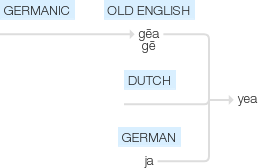Yea
Old English gēa, gē, of Germanic origin; related to Dutch and German ja .
wiktionary
From Middle English ye, ȝea, ya, ȝa, from Old English ġēa, iā(“yea, yes”), from Proto-Germanic *ja(“yes, thus, so”), from Proto-Indo-European *yē(“already”). Cognate with Scots yea, ya(“yes, yea, indeed, so”), Saterland Frisian ja, jee(“yes”), West Frisian ja(“yes”), Dutch ja(“yes”), German ja(“yes, yea”), Danish ja(“yes, yea”), Swedish ja, jo(“yes, well, indeed”), Icelandic já(“yes”), Latin iam(“now, already”), Italian già(“now, already”), Spanish ya(“now, already”), Polish już(“already”).
From yeah.
See yay.
etymonline
yea (adv.)
Old English gea (West Saxon), ge (Anglian) "so, yes," from Proto-Germanic *ja-, *jai-, a word of affirmation (source also of German, Danish, Norwegian, Swedish ja), from PIE *yam-, from pronominal stem *i- (see yon). As a noun, "affirmation, affirmative vote," from early 13c.
